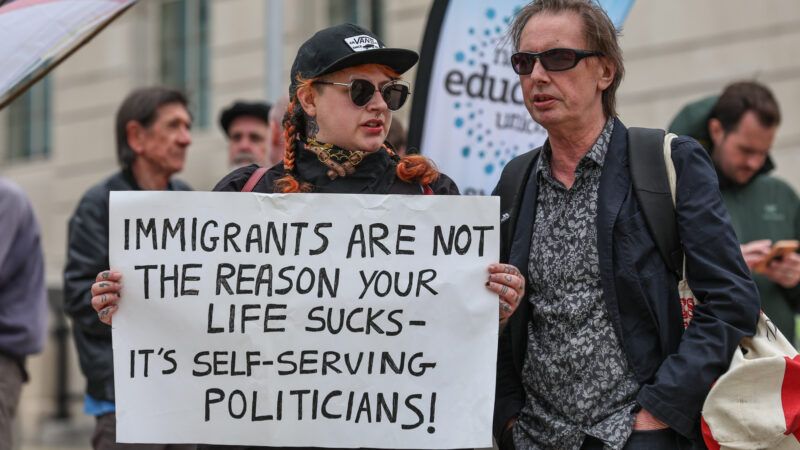U.K. Politicians Target Social Media To Deflect From Riots and Civil Unrest
As Britain grapples with riots, politicians shift focus to “holding tech accountable” by pushing for censorship and sidestepping the deeper issues fueling the chaos.

As riots rock the streets of cities across Britain, some Members of Parliament (MPs) are trying to blame social media—they do not want government policy on issues such as immigration, policing, and social services to be at the center of the discussion about the country's civil unrest. Instead, they argue that these riots are primarily fueled by discussions happening on social media and are using the opportunity to advocate for restrictions on U.K. citizens' speech and access to information.
MPs want social media companies to ban user accounts accused of inciting violence, and they have criticized these companies for not following such instructions previously. Labour MP Chris Curtis argued that social media bosses need to "step up and deal with vile messages stoking division and egging on violence." Similarly, Conservative and Shadow Home Secretary James Cleverly said it was "unacceptable for [social media companies] to take the profits but not comply with their responsibilities." Some MPs even want to haul X owner Elon Musk before a Parliamentary committee to explain the platform's "role in spreading misinformation."
Although not in effect until 2025, the U.K.'s Online Safety Act has been referenced as a vehicle to curtail allegedly harmful opinions that politicians say are fueling rioting. The controversial law sanctions sites if they host content that is potentially harmful to users. Ofcom, the British media regulatory body responsible for enforcing the act, has already warned social media companies to ensure compliance with existing and incoming laws about online speech, including their legal obligation to remove "hatred, disorder, provoking violence or certain instances of disinformation."
The Online Safety Act gives the U.K. government powerful control over digital discourse in the name of "safety." In the context of British civil unrest, it's clear we should all recognize just how easily well-intentioned policies to improve online safety can turn into expansive online censorship regimes. In the U.S., Senators Marsha Blackburn (R–Tenn.) and Richard Blumenthal (D–Conn.) are pushing the Kids Online Safety Act (KOSA)—a proposal quite similar to the UK's Online Safety Act.
Making businesses liable for speech that is not their own is fraught with unintended consequences, especially for free speech. Imposing legal responsibility for the speech of private citizens onto those not actually speaking, in this case online platforms, strongly incentivizes those businesses to remove any content that could invite legal scrutiny.
Holding sites liable for the speech of their users is neither fair nor sensical. Let's be clear: the "vile messages" Curtis bemoans are the opinions of British citizens, not those of Facebook, X, or Telegram. Instead of addressing citizens' concerns about their policy choices, politicians are trying to shift the blame. Proposals to spread liability enable the government to frame these rules as merely "holding businesses accountable," allowing them control over online discourse without the messy optics of jailing citizens for wrongthink.
Without a First Amendment, U.K. citizens lack a reliable body of law to prevent the government from using legal action to force private media businesses to censor on its behalf.
As users increasingly turn to social media messaging rather than news feeds, making messaging apps like Telegram and WhatsApp liable for private conversations poses an even more alarming threat to the free flow of information online. Many proposals to "hold tech accountable" impact both traditional newsfeeds and direct messages. By holding them liable for the private messages of their users, messaging services would be forced to surveil the conversations of their users and water down the use of encryption—a key technology that protects the digital privacy and security of all internet users—to avoid government crackdowns.
The once-global internet is fragmenting. Other governments across the world are asserting control over the digital realm with increasing boldness. Turkey recently banned Instagram for removing pro-Hamas content, while Venezuelan dictator Nicolás Maduro urged supporters to ditch WhatsApp, fearing its use by dissenters. Such moves, once unthinkable, are now commonplace. The internet looks increasingly different depending on where you log on.
Europe, including but not limited to the European Union, is sadly following this trend. They may reject certain values of countries like Turkey and Venezuela, but their approach to online information is similar. Their policymakers believe that the free flow of information online is a bug, not a feature. As a result, they want to force tech companies to filter out speech the government finds undesirable.
In America, some politicians are drawing inspiration from European advocates of internet censorship. KOSA is just one of the proposals making progress in Congress that reflects the dangerous and un-American belief that free speech causes more harm than good.
While the First Amendment protects free speech in America, it hasn't stopped politicians from pushing government control over online discourse under the guise of child safety and combating misinformation. If enacted, these proposals could prompt courts to weaken America's fundamental free speech protection, all while failing to achieve their stated goals. The developing conversation about citizens' speech on social media and the riots in the U.K. demonstrates how quickly well-intentioned regulations can morph into regimes that undermine the core principles of a free society.


Show Comments (65)